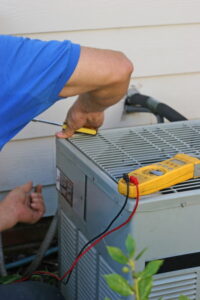
In a previous post, we addressed the problems that occur when an air conditioner leaks refrigerant. The refrigerant in an AC is supposed to stay at the same level for the entire lifespan of the system. This set amount is known as the air conditioner’s charge, and if it drops below the factory-set level, it will cause numerous problems culminating in the compressor burning out.
However, the opposite situation is also a problem. The charge of an AC must be precise. If an air conditioner has more refrigerant in it than it’s supposed to, it’s known as overcharged—and it will also lead to a dead AC unless repair technicians bleed out the excess refrigerant and restore the correct charge.
How an air conditioner can become overcharged
It’s easy to understand why an AC can lose its refrigerant charge: leaks. But how does too much refrigerant get into an air conditioner?
There are several ways, but amateur mistakes are the most common. Refrigerant isn’t placed into an air conditioner at the factory; the installers charge the system with refrigerant as one of the last steps of installation. Amateur technicians who aren’t licensed to handle refrigerant may put too much in the AC because they mistakenly believe that too much is better than too little. Amateurs trying to repair an AC leaking refrigerant may also overcharge the system because they don’t understand how to properly do the job. These are more reasons why you should only entrust air conditioning services to licensed professionals.
Finally, you may encounter someone who claims to be an HVAC technician who recommends you “top off” the refrigerant before summer. Don’t believe this: the only time more refrigerant should go into your AC is during a repair for leaks.
Why an overcharged air conditioner causes problems
The general problem with either undercharging or overcharging an AC is that it alters refrigerant pressure inside the system, and an air conditioner cannot function correctly at the wrong pressure.
One of the specific dangers of overcharging is slugging and floodback. This is when cold liquid refrigerant enters the compressor, either because it moved in the wrong direction (floodback) or cooled down too much (slugging). Both can happen because of overcharging. Refrigerant is supposed to enter the compressor as gas. If it enters as a liquid, it will get caught in the cylinders of the compressor and lead to the compressor overheating and burning out. If you hear a loud banging noise or squealing sound from the compressor, it might be suffering from slugging or floodback.
An overcharged AC will experience other troubles before compressor failure. Contrary to expectations, more refrigerant does not result in too much cooling. The opposite will occur: the performance of the AC will decline and it will deliver less cooling than it should. The excess refrigerant in the compressor won’t cool down enough as it absorbs heat, and this will lead to the development of ice on the coil, which slows down heat absorption.
If you think your AC is overcharged, call us for air conditioning repair in Maumelle, AR right away. We’ll get to the bottom of the issue and solve it to rescue your AC.
Dewees HVAC proudly serves the Conway area. Call us for AC repairs—we are here to keep you comfortable!
